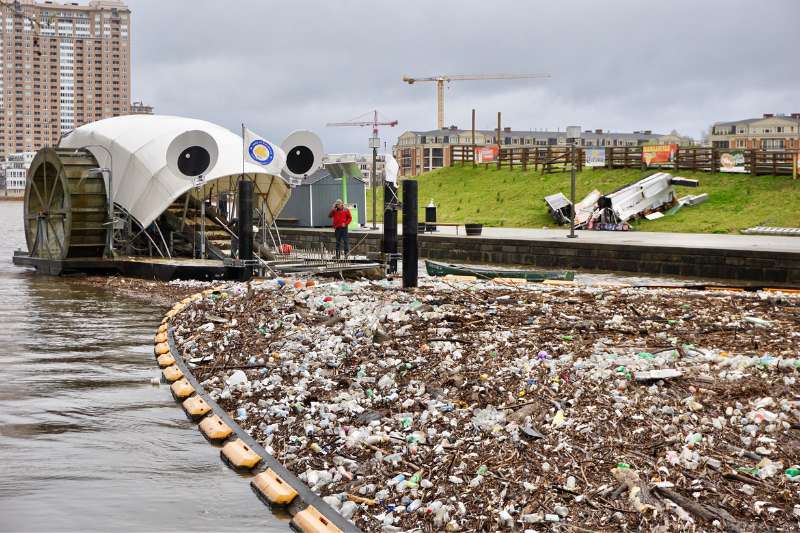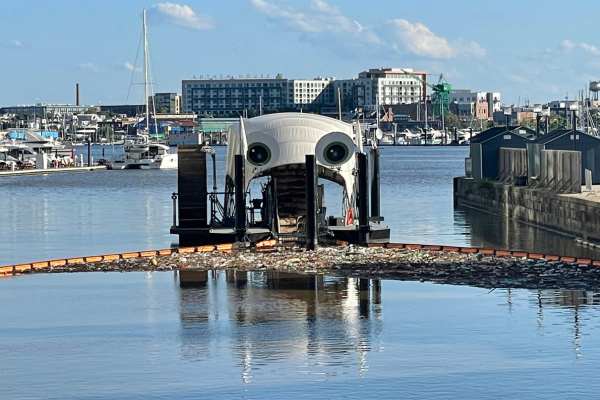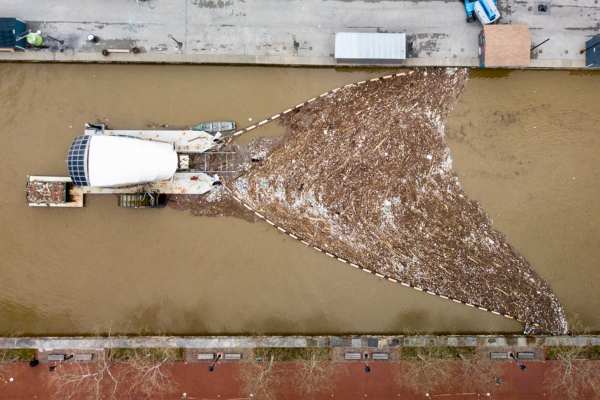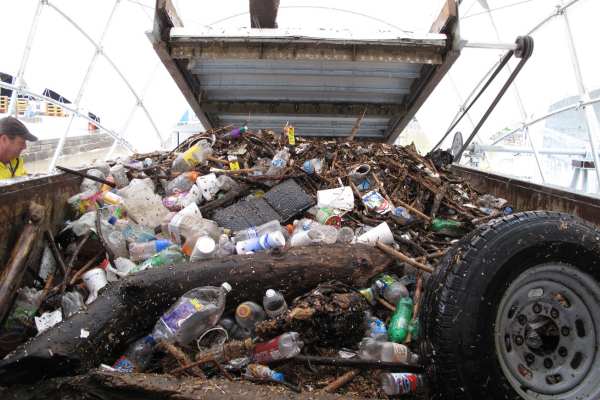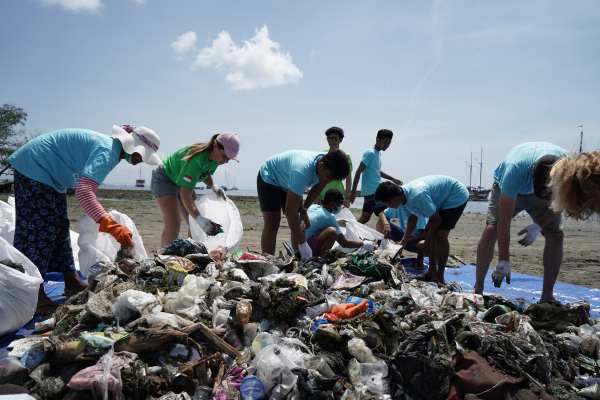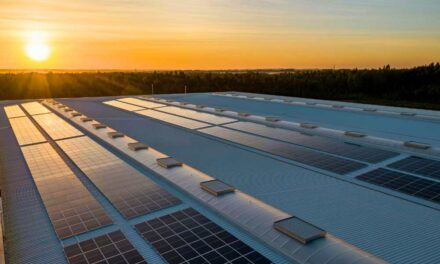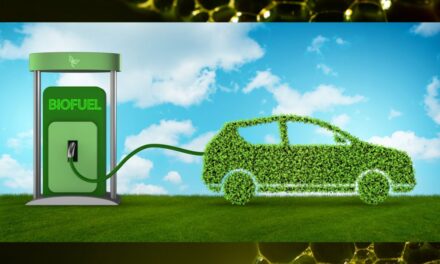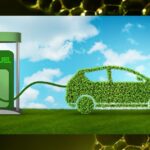Charting a Course for Cleaner Oceans Through Innovation and Collaboration
Plastic pollution has reached alarming levels, posing a significant threat to our planet’s ecosystems and human well-being. Despite the challenges, innovative solutions and cutting-edge technologies are emerging to combat this global crisis. They offer hope for cleaner oceans and waterways and a more sustainable future.
Ocean cleanup projects, improved waste infrastructure, and biodegradable plastics are making strides toward mitigating plastic pollution in water bodies. Our most promising solution to tackling such a monumental problem is by working in tandem to combat the crisis on several fronts.
Breakthrough Technologies for Cleaner Oceans and Waterways
The Ocean Cleanup, a non-profit organization, is just one group that is working to organize voluteer efforts and develop and scale technologies to rid the oceans of plastic. The organization’s goal is to rid the ocean of 90% of the five trillion pieces of plastic that currently litter our seas. Solutions like creating artificial coastlines to concentrate, collect, and properly dispose of plastic are currently underway.
Catching plastic within major waterways before they end up in the ocean is another popular approach. Rivers are the main sources of ocean plastic pollution and are considered by The Ocean Cleanup to be “arteries that carry waste from land to the ocean.”
The Interceptor Original is The Ocean Cleanup’s first river cleanup technology. This 100% solar-powered barge extracts plastic autonomously. Trash is collected through a conveyor belt and shuttled into a dumpster for proper disposal.
The Waterfront Partnership of Baltimore, along with several other stakeholders and contributors, has implemented a similar solution in the waters of Baltimore Harbor.
Mr. Trash Wheel, Baltimore’s first semi-autonomous trash interceptor, was introduced in 2014. He now chugs his way along the harbor cleaning up refuse. He is joined by three more interceptors, Professor Trash Wheel, Captain Trash Wheel, and Gwynnda the Good Wheel of the West.
Utilizing a combination of solar and hydropower, trash is funneled through containment booms into Mr. Trash Wheel’s “gaping mouth.” The device then rakes the trash onto a conveyor belt and into a dumpster on a separate barge for incineration that creates electricity.
The trash wheel fleet is now pulling tons of trash out of the harbor each year that would likely end up in the ocean. The most Mr. Trash Wheel has ever collected in a single day is 38,000 lbs. More trash wheels are planned for Texas, California, and Panama.
One of the most promising approaches to reducing plastic pollution is the development of biodegradable alternatives.
Innovators across the globe are working to create sustainable materials that can replace conventional plastics without compromising functionality.
Biodegradable plastics are a dream solution to a major problem. Plastic bags, utensils, and cup lids don’t break down during typical composting and contaminate other recyclable plastics. This creates headaches for recyclers. Most compostable plastics, made primarily of the polyester known as polylactic acid, or PLA, end up in landfills and last as long as forever plastics.
But scientists are on to a solution to make compostable plastics break down more easily.
By embedding polyester-eating enzymes into the plastic when it is produced, heat and water would be able to break down the product within weeks, solving a major problem that has confounded the plastics industry and environmentalists for decades.
Ting Xu, UC Berkeley professor of materials science and engineering and of chemistry, said that programmed degradation could be the key to recycling many objects, the article noted. “Imagine,” she said, “using biodegradable glue to assemble computer circuits or even entire phones or electronics, then, when you’re done with them, dissolving the glue so that the devices fall apart and all the pieces can be reused.”
Together, we can make a difference.
Education and awareness play a pivotal role in combating plastic pollution. Engaging local communities through cleanup initiatives, awareness campaigns, and sustainable practices can significantly reduce the flow of plastic into water ecosystems. Armed with the right knowledge, we can all make informed choices, adopt sustainable practices, and advocate for change.
Empowering communities to take action against plastic pollution is crucial.
Engaging individuals, schools, businesses, and local organizations through education, awareness campaigns, and grassroots initiatives can make a huge difference over time. These efforts encourage behavioral change, promote responsible consumption and waste management, and foster a sense of collective responsibility in tackling plastic pollution. Community-led initiatives play a vital role in driving long-term change and creating a sustainable future.
Grassroots movements and organizations are instrumental in championing the cause, driving policy changes, and pushing for regulations that prioritize waste reduction and sustainable practices.
Companies Making an Impact with Ocean-Friendly Practices:
- Sea2See: This B Corporation became pioneers in the eyewear and watch sectors, using recycled marine polymer in their products and developing a sustainable solution to reduce marine plastic and improve the lives of marginalized coastal communities.
- 4Ocean: Another certified B Corporation, 4Ocean sells reusable alternatives to common single-use plastic items (like bottles and cups), cleanup kits, and sustainable accessories. Their bracelets, made with stainless steel and certified recycled 4Ocean plastic, are a symbol of the fight against ocean pollution. With every 4Ocean product, you will also get a One Pound Promise, which ensures that one pound of trash will be pulled from the ocean, rivers, and coastlines.
Looking to Make a Direct Impact? Become a Volunteer!
- Clean Ocean Action: This organization offers various volunteer opportunities, including beach cleanups, water quality monitoring, and educational programs.
- Pacific Beach Coalition: Volunteers can participate in monthly beach cleanups or other events, become student liaisons, spread the word over social media, or join the coalition itself and become full-fledged members.
- Surfrider Foundation: This organization sees beach cleanups as a multi-part way to solve a global problem. Not only do these events help clean up the beach, but they also raise awareness about the issue of plastic pollution.
- Ocean Blue Project: This organization encourages individuals to organize their own beach cleanups in their community. They provide resources and educational materials to help individuals understand how pollution flows from our own backyards, streets, and local waterways into our drinking water and into our one-world ocean. They educate the community on how pollution is harming our health and marine organisms.
- Ocean Cleanup Group: This non-profit runs a free search engine that uses advertising revenue to fund ocean cleanup projects. Over 450,000 pounds of plastic have been removed from the ocean with the help of over 10 million searches.
- The Lonely Whale: Started by Entourage star Adrian Grenier and producer Lucy Sumner, this organization was inspired by the sad story of 52 Blue, the world’s loneliest whale. Though the organization does engage in cleanups, the main tenet behind its activism is addressing the system itself and stopping the pervasive use and promotion of single-use plastics.
- GoEco: Recognized as the Top Volunteer Abroad Organization in 2018 by GoAbroad, GoEco specializes in affordable, ethical community and conservation projects around the world. Founded in 2006, GoEco has placed more than 17,000 volunteers in programs abroad.
Charting the Course to Cleaner Oceans
Cleaning up our oceans shouldn’t be a task left only to coastal communities. Governments, businesses, non-governmental organizations, and individuals worldwide must unite to tackle this global challenge. We can make a difference through comprehensive strategies that prioritize waste reduction, proper waste management, recycling initiatives, and the development of sustainable alternatives to single-use plastics.
As the magnitude of plastic pollution becomes increasingly evident, so does the need for innovative solutions and technologies to mitigate its impact. We can collectively work towards a plastic-free future by embracing these advancements, supporting research and development, and fostering collaboration between industries, governments, and individuals.

Written by Carley Kimball
Freelance Journalist and OPL Content Contributor
“I’ve always tried to implement planet-friendly practices in my life but didn’t quite realize just how much of an impact individuals can make until I was introduced to One Planet Life. I’m so excited to be able to utilize my professional skills to contribute valuable information and positive personal experiences to help make the world a better place.”

